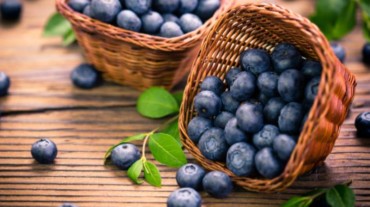
One of the biggest drawbacks of working out rigorously is muscle wear and tear. While exercise does strengthen our muscles, it also inflicts a little bit of damage. To fix this, we rely on certain foods that can boost muscle repair and growth.
According to a group of researchers from Cornell University, the number one food that helps you out in this regard happens to be blueberries. Their study, the findings of which were published in the Journal of Nutrition, evaluated how a blueberry-rich diet affects the cells responsible for muscle growth and repair.
In six weeks, the researchers studied around 22 women, 12 aged 25-40 and 10 aged 60-75. The participants consumed the equivalent of 1.75 cups of fresh blueberries every day, served in the form of freeze-dried blueberries (19 grams in the morning and 19 grams in the evening), along with their regular food intake. As a part of the study, these participants were also asked to avoid other foods rich in polyphenols and anthocyanins.

After around 1.5 hours of consuming the morning dose of blueberries, a serum was obtained from the participants to allow the researchers to investigate the effects of blueberry on the muscle progenitor cell functions on grounds of cell number, capacity to manage oxidative stress, and metabolism.
This is what the researchers found
The results showed the six-week blueberry-enriched serum obtained from the women aged 25-40 increased human muscle progenitor cell numbers in culture. There could be seen a consistently lower percentage of dead human muscle progenitor cells, which indicates resistance to oxidative stress, as well as increased oxygen consumption of the cells. However, for the participants aged between 60-75 who consumed the blueberry-enriched diet, no beneficial effects were seen in the muscle progenitor cells.
“The consequences associated with the deterioration of skeletal muscle are a loss of mobility, decreased quality of life, and ultimately, loss of independence. Currently, research on dietary interventions to support skeletal muscle regeneration in humans is limited. This preliminary study of muscle progenitor cell function paves the way for future studies to develop clinical interventions,” said the lead investigator of the study, Anna Thalacker-Mercer, Ph.D.

“While the results cannot be generalised to all populations, this study is an important step in translating findings from cell culture and rodent studies to a potential dietary therapy for improving muscle regeneration after injury and during the ageing process,” she added.
The Centers for Disease Control and Prevention (CDC) states that muscles lose strength, flexibility, and endurance over time. After the age of 30, muscle mass decreases by three to five per cent every decade. And by the time you are 60, the rate increases. Therefore, strategies to improve muscle progenitor cell proliferation and lower oxidative stress may also benefit muscle regeneration during the ageing process.
The role that blueberries may play in promoting good health, including cardiovascular health, diabetes management, brain health, exercise, and the gut microbiome however, still needs to be discussed.
(With Inputs from ANI)
Select Topics of your interest and let us customize your feed.
PERSONALISE NOW